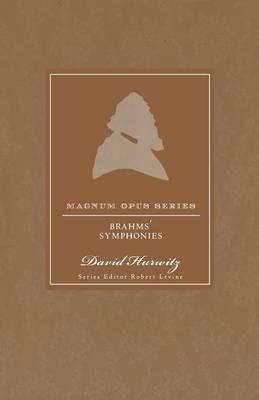Magnum Opus
2 total works
Though Brahms' symphonies are often treated somewhat like medicine, as something 'good for you', but otherwise lacking in purely sensual pleasure, David Hurwitz takes the reader beyond the jargon and pedantry and unlocks the mystery (and the joy) contained within Brahms' symphonies. In short, Brahms was a musician's musician, in some respects and 'academic' (which is not to say 'pedantic') composer, and so it's practically impossible for professional scholars and musicians to approach his music without wanting to demonstrate at some point that they are as smart as Brahms, and uniquely able to unravel the technical intricacies of his larger works. For the general reader, this obviously represents a problem; indeed, it's not exactly a joy for the music professional either. Indeed, there is a sense in which Brahms' own seriousness of purpose is mistaken for a uniform seriousness of expression, with the result that his music is often treated somewhat like medicine, as something 'good for you', but otherwise lacking in purely sensual pleasure.
Brahms' well-known struggles with orchestration compound this impression, but since no less an authority than Ravel praised the orchestration of the Second Symphony, we know that this fact is, at best, a generalization only partially true. "Magnum Opus" is a series for anyone seeking a greater familiarity with the cornerstones of Western Classical Music - operatic, choral and symphonic. Always passionate, down-to-earth, and authoritative on the works and their creators, "Magnum Opus" is an indispensable resource for anyone's musical library and the perfect gift for the music-lover in your life.
Brahms' well-known struggles with orchestration compound this impression, but since no less an authority than Ravel praised the orchestration of the Second Symphony, we know that this fact is, at best, a generalization only partially true. "Magnum Opus" is a series for anyone seeking a greater familiarity with the cornerstones of Western Classical Music - operatic, choral and symphonic. Always passionate, down-to-earth, and authoritative on the works and their creators, "Magnum Opus" is an indispensable resource for anyone's musical library and the perfect gift for the music-lover in your life.
This book aids the listener in getting beneath the surface of Beethoven's two beloved symphonies.Composers often write pieces in highly contrasting moods in very close proximity. But no composer took this process further than Beethoven. His famous "Fifth Symphony", with an opening familiar to anyone, became the standard for the Romantic, tragedy to triumph, 'victory symphony'. The sunny Sixth however represents a high-water mark of relaxed lyricism. On a superficial listening, they couldn't sound more different from one another. Yet by examining them more closely it is revealed that they have more in common than their emotional trajectories might suggest.This book aids the listener in getting beneath the surface of these two beloved symphonies, revealing that however disparate the expressive message, the language and style remain Beethoven's - a symphonic voice as powerful in struggle and victory as in relaxation and meditation."Magnum Opus" is a series for anyone seeking a greater familiarity with the cornerstones of Western Classical Music - operatic, choral and symphonic.
Always passionate, down-to-earth, and authoritative on the works and their creators, "Magnum Opus" is an indispensable resource for anyone's musical library and the perfect gift for the music-lover in your life.
Always passionate, down-to-earth, and authoritative on the works and their creators, "Magnum Opus" is an indispensable resource for anyone's musical library and the perfect gift for the music-lover in your life.

